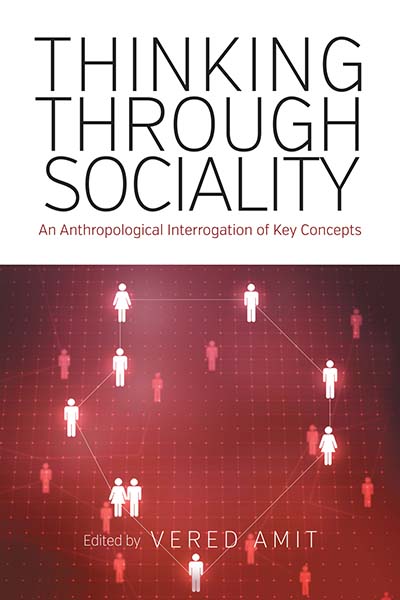This is a guest post written by Vered Amit, who edited the volume Thinking Through Sociality: An Anthropological Interrogation of Key Concepts (now available in paperback!). Read the Introduction online for free.
How did the Volume Come to Be?
Conference sessions usually bring together scholars who share a research interest in a particular subject, area or region of investigation. In contrast, this volume had its beginnings, some years ago, in a conference session that I organized with the intent of sidestepping this kind of delimitation by deliberately bringing together participants whose research spanned a wide variety of different subjects: childhood, mobility, sport, citizenship, music, media and voluntary associations. My effort to draw together panelists with such diverse interests was provoked by a sense that the conceptual repertoire of sociality invoked by anthropologists had not always kept pace with the diversifying range of contemporary circumstances which they were interrogating. What were the limitations of familiar concepts such as community, for handling some of the situations being encountered by panel participants in their fieldwork? Were there alternative notions that might be as, or more effective in certain contexts and could any of these ideas ‘travel’ effectively across the different circumstances and issues which we were respectively addressing? That first session produced such an interesting set of exchanges and ideas that we ended up meeting again repeatedly: in conference sessions, online, and in two extended face-to-face workshops. These ongoing conversations had the immediate effect of enriching our individual analyses and publications in several ways. First, they provided us with some fresh perspectives on our assumptions and questions. Terms that were commonplace in one kind of field, might have a different history and implication for group members working on a different subject. But we also noted some revealing convergences. For example, in our respective efforts to further refine our respective theoretical frameworks, a number of us had already begun to review elements in the history of ideas – in anthropology and social theory more generally – around notions of association and sociality. Because we met repeatedly, we also had a chance to try out our ideas and applications and get feedback over time rather than in a quick commentary at the end of a conference session.
We eventually decided to move towards a joint publication that reflected the progression of our exchanges. While our exchanges were always informed by our respective ethnographic studies, we also wanted to move beyond case studies alone to also consider the conceptual histories that had been useful in trying to think through our research materials. Our collaboration was not, however, intended to produce a unified theory of sociality either in each chapter or for the volume as a whole. We have all used and continue to use a variety of different concepts to address a range of issues. But we each selected as the focus for our respective chapters, a particular concept that had been especially useful or provocative in our research. The resulting essays both provided a review of the history of ideas that had contributed to the development of this concept as well as a sense of the ways in which we could relate this concept to field materials. They truly represent efforts to ‘think through sociality’.
Most of us were able to meet as a group once again after the initial hard cover publication of the book. But as several contributors have noted, then and since, the series of intellectual exchanges that informed the development of the book were as rewarding as its publication. It is unusual, in my experience as an academic, for such a diverse and dispersed (based in 6 countries across 3 continents) group of scholars, to come together on such a sustained basis over so many years without an institutional base or joint research project. It would be surprising therefore if, in spite of all the other competing affiliations, obligations and involvements that command our respective energies, the end of our collective conversation didn’t create a sense of something lost. Perhaps it will soon be time to initiate a new conversation.

